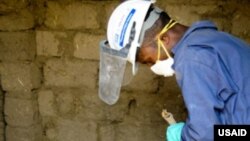“In Ethiopia, progress in fighting malaria has contributed to the remarkable reduction in overall mortality among children under five,” wrote Peter Vrooman, U.S. Chargé d’affaires in Ethiopia. In an op/ed entitled “Ending Malaria for Good is a Sound Investment,” Mr. Vrooman noted that global progress in the fight against malaria since 2000 has been truly historic and the U.S. Government has played a key role in this progress.
The World Health Organization estimates that more than 6.8 million malaria deaths were averted worldwide between 2001 and 2015, primarily among children under five years of age in sub-Saharan Africa.
Despite this progress, he warned, around the world a child dies every two minutes from malaria. More than 400,000 people will die from malaria this year and the vast majority will be young children in sub-Saharan Africa. This region bears a disproportionate share of malaria’s burden. In 2015, 90 percent of all malaria cases and 92 percent of malaria deaths occurred in the region.
“The U.S. Government has been a leader in the fight against malaria, particularly through U.S. President’s Malaria Initiative, or PMI, launched in 2005,” Mr. Vrooman noted.
“The initiative operates in 19 countries across sub-Saharan Africa, including Ethiopia. The initiative is led by the U.S. Agency for International Development, and implemented together with the U.S. Centers for Disease Control and Prevention.”
Through PMI, hundreds of millions of people have benefited from protective measures and hundreds of millions more have been treated for malaria. In Ethiopia, PMI has procured about 20 million insecticide treated bed nets, 9 million rapid diagnostic tests, and more than 15 million treatments to prevent malaria. PMI also trains health care workers to strengthen their capacity to fight the disease.
Beyond improving child survival and maternal health, malaria control contributes substantially to eradicating extreme poverty and improving educational outcomes. Experts estimate a $60 return for every dollar invested in malaria prevention in the region.
“We must all join our efforts to end malaria in Ethiopia and worldwide, once and for all,” Mr. Vrooman concluded.
“Beating diseases like malaria is the right thing to do. It’s also the smart thing to do.”












